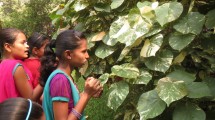Abstract
In the psychology of teaching, teaching of knowledge is one of the central themes. The psychology of teaching itself is also knowledge, so that the psychology of teaching and the teaching of psychology mutually include each other. Here, I would like to consider a phenomenon in the art of questioning in teaching a literary work of art and would like to show its relevance to the psychology of teaching in general.
Similar content being viewed by others
References
Apel, K.-O. (1984/1979). (trans. Georgia Wamke). Understanding and explanation: A transcendental pragmatic perspective (Die Erklären-Verstehen-Kontroverse in transzendental-pragmatischer Sicht). Cambridge, MA: The M.I.T. Press.
Bergson, H. (1938/1900). (trans. Tatsuo Hayashi). Warai (Le Rire). Tokyo: Iwanami-shoten.
Bollnow, O.F. (1978). (trans. and ed. Takashi Morita and Keiichi Ohtsuka). Toi heno Kyouiku: Tetusgakuteki-ningengaku no Michi (Erziehung zur Frage). Tokyo: Kawashima-shoten.
Freund, J. (1974/1973). (trans. Yoshitomo Takeuchi and Kouji Kakita). Ningenkagaku no Shoriron (Les Théories des Sciences Humaines). Tokyo: Hakusui-sha.
Gadamer, H.G. (1975/1965). (trans. and ed. Garrett Barden and John Cumming). Truth and method (Wahrheit und Methode). New York: The Seabury Press.
Giorgi, A. (1971). Psychology as a human science: A phenomenologically based approach. New York: Harper and Row.
Habermas, J. (1971/1968). (trans. Jeremy J. Shapiro). Knowledge and human interests (Erkenntniss and Interesse). Boston: Beacon Press.
Hempel, C.G. (1973/1965). (trans. Gen-ichiro Nagasaka). Kagakutekisetsumei no shomondai (Aspects of scientific explanation). Tokyo: Iwanami-shoten.
Ingarden, R. (1973). (trans. R.A. Crowley and K.R. Olson). The cognition of the literary work of art (Vom Erkennen des literarischen Kunstwerk). Evanston: Northwestern University Press.
Jaspers, K. (1953/1948). (trans. Yushi Uchimura, Shihou Nishimaru, Toshiki Shimazaki and Keizo Okada). Seishinbyorigaku-Soron (Allgemeine Psychopathologie, 5 Auflage), in 3 vols. Tokyo: Iwanami-shoten.
Mackay, D.M. (1969). Information, mechanism and meaning. Cambridge, MA: The M.I.T. Press.
Maruyama, T. (1985). Ningen kagaku houhou ronso (On the debate on the methodology of the human science). Tokyo: Keizo-shobo.
Plessner, H. (1984/1970). (trans. Sizuo Takiura and others). Warai to Naki no Ningengaku (Philosophische Anthropologie: Lachen and Weinen). Tokyo: Kinokuniya-shoten.
Schutz, A. (1967/1932). (trans. G. Walsh and F. Lehnert). The phenomenology of the social world (Der sinnhafte Aufbau der sozialen Welt). Evanston: Northwestern University Press.
Schutz, A. and Luckmann, T. (1973/1975). (trans. R.M. Zanzer & H.T. Engelhardt, Jr.). The structures of the life-world (Strukturen der Lebenswelt). Evanston: Northwestern University Press.
Shiga, N. (1968). Seibei to Hyotan/Abashiri made (Seibei and the gourds). Shincho-sha.
Strasser, S. (1978/1962). Ningenkagaku no Rinen: Genshougaku to Keikenkagau tono Taiwa (Phänomenologie und Erfahrungswissenschaft vom Menschen: Grundgedanken zu einem neuen Ideal der Wissenschaftlichkeit). Tokyo: Shinyosha
Strasser, S. (1985). Understanding and explanation: Basic ideas concerning the humanity of the human sciences. Pittsburgh: Duquesne University Press.
Straus, E.W. (1966). Phenomenological psychology. New York: Basic Books.
Takeda, T. (1964). Bungaku no Jugyo (Teaching literature). Tokyo: Meijitosho.
Takeda, T. (1973). Imeiji wo Sodateru Bungaku no Jugyo (Teaching literature: Fostering imagination). Tokyo: Kokudosha.
Toyota, H. (1988). Meijiki-Hatsumonron no Kenkyu: Jugyo Seiritu no Genten wo Saguru (A treatise concerning studies on questioning in the Meiji-era [1867–1912] — Searching for the origin of teaching). Kyoto: Minerva-shobo.
Valle, R.S. and King, M. (1978). Existential-phenomenological alternatives for psychology. New York: Oxford University Press.
Valle, R.S. and King, M. (1978). An introduction to existential-phenomenological thought in psychology. In R.S. Valle and M. King (Eds.): 3–17.
von Wright, G.H. (1984/1971). (trans. Takashi Maruyama and Nobuo Kioka) Setsumei to Rikai (Explanation and understanding). Tokyo: Sangyo-tosho.
Weinsheimer, J.C. (1985). Gadamer's hermeneutics: A reading of truth and method. New Haven: Yale University Press.
Winch, P. (1977/1958). (trans. Makio Morikawa) Shakaikagaku no Rinen (The idea of a social science and its relation to philosophy). Tokyo: Shinyo-sha.
Yasunaga, H. (1986). Seishin-igaku no Houhouron (A methodology of psychiatry). Tokyo: Kongo-shuppan.
Yoshida, A. (1987). Manabu to Oshieru: Jugyo no Genshougaku heno Michi (“I learn” and “I teach”: A way to a phenomenology of teaching). Tokyo: Kaimeisha.
Author information
Authors and Affiliations
Rights and permissions
About this article
Cite this article
Yoshida, A. On the why-what phenomenon: A phenomenological explication of the art of asking questions. Hum Stud 15, 35–46 (1992). https://doi.org/10.1007/BF00142730
Issue Date:
DOI: https://doi.org/10.1007/BF00142730




